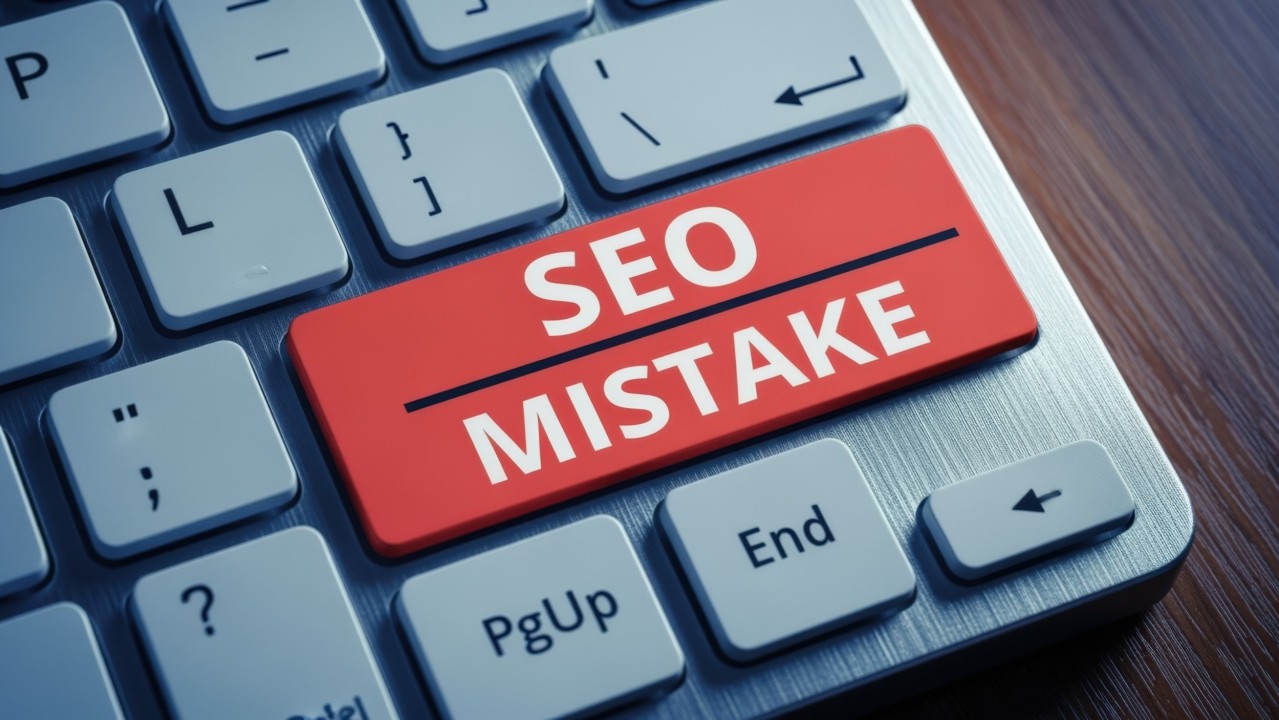News
Google Over The Years: Understanding The Algorithm & How AI Can Impact It
Google is one of the most popular search engines on the planet. It was founded in 1998 by Larry Page and Sergey Brin, who were both students at Stanford University. Since then, it has grown into a global behemoth, with over 90% of all internet searches being conducted on the platform. In this whitepaper, we will delve into the history of Google and search rankings, including UK and worldwide statistics.
The Early Days of Google
Google began as a research project at Stanford University. Larry Page and Sergey Brin were interested in creating a search engine that would be more efficient than the ones that existed at the time. They developed an algorithm that ranked pages based on their relevance to a user’s search query, as well as the number of links pointing to that page. This algorithm, called PageRank, became the foundation of Google’s search engine.
Google launched in 1998 and quickly became popular with internet users. By 2000, it had become the world’s largest search engine, with a market share of over 50%. Its popularity was due to its fast and accurate search results, as well as its simple and easy-to-use interface.
Google’s search algorithm has gone through several updates over the years. In 2003, Google introduced the Florida update, which penalized websites that used “black hat” SEO tactics, such as keyword stuffing and link farming.
Google had to adapt to changing user behaviors and website owners’ attempts to manipulate its algorithm.
· The Panda Update
In 2011, Google launched the Panda update, which aimed to penalize low-quality websites with thin or duplicated content, keyword stuffing, and other practices that undermined the user experience. This update marked a significant shift in Google’s algorithm, prioritizing the quality of content over the quantity of keywords.
· The Penguin Update
The Penguin update, launched in 2012, targeted websites with manipulative link building practices, such as buying links or using link farms. This update forced website owners to focus on building high-quality, relevant links rather than simply accumulating as many links as possible.
· The Hummingbird Update
The Hummingbird update, launched in 2013, marked a significant shift in Google’s algorithm. It focused on the intent behind a search query, rather than just matching keywords. This update was a significant step towards Google’s goal of providing users with more relevant, personalized search results.
· The RankBrain Update
RankBrain, launched in 2015, was a machine learning algorithm that improved Google’s ability to understand the meaning behind a search query. This update was a significant step towards Google’s goal of providing users with more accurate search results, even for complex or ambiguous queries.
· The BERT Update
The BERT update, launched in 2019, was another significant step towards Google’s goal of understanding the context behind a search query. This update improved Google’s ability to understand the nuances of natural language, leading to more relevant search results.
Google’s dominance in the UK search market is similar to its worldwide dominance. As of 2021, Google has a market share of over 90% in the UK. This is largely due to the accuracy of its search results and its simple and user-friendly interface. In the UK, the most popular search terms include “weather,” “news,” and “jobs.”
Google’s dominance in the search market is not limited to the UK. As of 2021, Google has a market share of over 92% worldwide. This includes countries such as the US, China, and India. The most popular search terms worldwide include “weather,” “news,” and “Facebook.”
Optimizing for Google’s Algorithm
To optimize a website for Google’s algorithm, website owners must focus on providing high-quality, relevant content that meets the user’s search intent. They must also prioritize building high-quality, relevant links and ensuring that their website is technically optimized for search engine crawlers. Following best practices for on-page optimization, such as optimizing meta tags, using header tags, and incorporating relevant keywords, can also improve a website’s search rankings.
In today’s digital age, having a website is crucial for any business or individual seeking to establish an online presence. However, simply having a website is not enough. To be successful, you need to ensure that your website is easily discoverable by search engines, particularly Google, the largest and most popular search engine worldwide. In this whitepaper, we will discuss the various techniques and strategies that you can employ to optimize your website for better search results.
Understanding Search Engine Optimization (SEO)
Search Engine Optimization (SEO) refers to the techniques and practices that website owners use to improve their website’s visibility on search engine results pages (SERPs). SEO helps search engines better understand your website’s content, structure, and relevance to particular queries, and in turn, improve your website’s ranking on SERPs.
To effectively optimize your website for SEO, it’s essential to understand how search engines work. Google, for instance, uses a complex algorithm that factors in hundreds of ranking signals to determine the relevance and quality of a website’s content. Some of the essential ranking signals that Google considers include the quality of the content, the relevance of the content to the search query, the website’s structure, the website’s load speed, and the presence of backlinks, among others.
On-Page Optimization:
On-page optimization refers to the optimization of elements on a website that directly impact search engine rankings. These elements include content, title tags, meta descriptions, headers, images, and internal linking structure.
· Content Optimization:
Creating high-quality content is key to a website’s success. The content on a website should be informative, relevant, and engaging. Here are some tips to optimize your content for better Google rankings:
Keyword Research: Identify the keywords and phrases that your target audience is searching for and incorporate them into your content.
Headings and Subheadings: Use descriptive headings and subheadings to organize your content and make it easier for readers to navigate.
Content-Length: The longer the content, the higher the chances of ranking on Google. Aim to create long-form content of 1,500 to 2,000 words.
Multimedia: Incorporate relevant images, videos, and infographics to enhance the visual appeal of your content.
· Title Tags and Meta Descriptions:
Title tags and meta descriptions are HTML elements that provide information about the content of a webpage. They appear on the search engine results page and play a crucial role in attracting potential visitors to click through to your website. Here are some tips for optimizing title tags and meta descriptions:
Keep it concise: Title tags should be no longer than 60 characters, and meta descriptions should be no longer than 160 characters.
Use target keywords: Include the primary keyword of your page in the title tag and meta description.
Use action-oriented language: Use compelling language that encourages readers to click through to your website.
· Headers:
Headers, also known as H1, H2, and H3 tags, are HTML elements that are used to structure the content on a webpage. Here are some tips for optimizing headers:
Use a single H1 tag: Use a single H1 tag for the main heading of your webpage.
Incorporate keywords: Use target keywords in your H1 tag and subheadings.
Use descriptive language: Use descriptive language in your headers to make it easier for readers to understand the content.
· Images:
Images are a powerful way to enhance the visual appeal of your website. Here are some tips for optimizing images:
Use descriptive file names: Use descriptive file names that include relevant keywords.
Compress images: Compress your images to ensure fast loading times.
Use alt tags: Include descriptive alt tags that describe the content of the image.
· Internal Linking:
Internal linking refers to the links within a website that connect pages together. Here are some tips for optimizing internal linking:
Use descriptive anchor text: Use descriptive anchor text that includes target keywords.
Link to relevant pages: Link to relevant pages within your website to provide additional context.
Create a hierarchy: Create a hierarchy of pages to establish a logical structure and make it easier for visitors to navigate.
On-page optimization is a critical factor in achieving higher rankings on Google search engine result pages. By following the tips outlined in this whitepaper, you can update your website for better Google rankings using on-page tactics. Remember to create high-quality content, optimize title tags and meta descriptions, use headers, optimize images, and optimize internal linking. By following these best practices, you can improve your website’s visibility and attract more organic traffic
Off-Page Optimization
Off-page optimization refers to the techniques that website owners use to improve their website’s ranking on SERPs outside of their website. Off-page optimization primarily focuses on building high-quality backlinks to your website from other reputable websites. Backlinks are critical because they signal to search engines that your website is a trustworthy and reliable source of information.
To build high-quality backlinks, you need to develop an outreach strategy that targets reputable websites in your niche. This may include guest blogging, creating high-quality infographics, and leveraging social media platforms to promote your content and attract backlinks.
Technical Optimization
Technical optimization refers to the techniques that website owners use to improve their website’s technical structure and performance to improve their ranking on SERPs. Technical optimization includes optimizing website load speed, implementing schema markup, improving website security, and ensuring that your website is mobile-friendly.
Technical optimization can be challenging, and website owners may require the assistance of a professional web developer or SEO specialist to ensure that their website is technically sound.
Understanding Google Rankings
Google’s search algorithm is constantly evolving to deliver the most relevant and useful results to its users. The search engine uses a complex algorithm to rank websites based on a variety of factors. While the exact details of the algorithm are kept confidential, there are some well-known factors that can affect your website’s ranking:
· Content Quality: Google values high-quality, original content that provides value to the reader. Make sure your website content is informative, well-written, and engaging.
· Keyword Usage: Keywords are the words and phrases that people use to search for information online. Incorporate relevant keywords into your content, but avoid keyword stuffing, which can result in penalties.
· Backlinks: Backlinks are links from other websites that lead to your site. Google sees backlinks as a sign of credibility and relevance, so it’s important to have a strong backlink profile.
· Page Speed: Google prioritizes websites that load quickly, as slow-loading pages can negatively impact user experience.
Optimizing Your Website for Google Rankings
Now that we understand the factors that affect Google rankings, let’s dive into some specific strategies for optimizing your website:
· Conduct Keyword Research: Identify the keywords that your target audience is searching for and incorporate them into your website content, including in the page titles, headers, and meta descriptions.
· Create High-Quality Content: Develop engaging, informative content that provides value to your target audience. Use internal linking to help guide readers to other relevant pages on your site.
· Build a Strong Backlink Profile: Focus on building quality backlinks from reputable websites in your industry. Avoid spammy backlinks, as they can result in penalties.
· Optimize Your Website’s Technical Structure: Ensure that your website is easy to navigate and loads quickly. Use a mobile-responsive design to ensure that your site is accessible on all devices.
· Monitor Your Website Analytics: Use tools like Google Analytics to track your website traffic and identify areas for improvement. Monitor your keyword rankings and adjust your digital marketing strategy as needed.
The Impact of Using ChatGPT and AI on Google Rankings: Can You Use AI-Generated Content?
Artificial intelligence (AI) has made significant strides in recent years, with ChatGPT and similar AI language models revolutionizing the world of content creation.
In a previous article we looked at ‘How Artificial Intelligence (AI) is Changing Search Engine Marketing & SEO Strategies’.
As the demand for high-quality, search engine optimized (SEO) content grows, the impact of AI-generated content on Google rankings is an important topic to explore. In this article, we will discuss the effects of using ChatGPT and AI-generated content on Google rankings, best practices for using AI in content creation, and real-life use cases.
Search engines, including Google, use complex algorithms to rank websites based on the relevance, quality, and usefulness of their content. As a result, high-quality, relevant, and engaging content is crucial for achieving high search engine rankings. AI-generated content, like that created by ChatGPT, has the potential to positively impact Google rankings if used correctly.
1. Enhanced Content Quality: ChatGPT can generate content that is informative, accurate, and engaging. By using AI to supplement human-generated content, you can improve the overall quality and depth of your content.
2. Improved Keyword Optimization: AI language models like ChatGPT can be trained to recognize and use relevant keywords and phrases, making it easier to optimize your content for search engines.
3. Consistent Content Updates: ChatGPT can help you maintain a consistent content schedule, as it can generate new material quickly and efficiently. Regularly updating your site with fresh content is an essential factor in improving your Google rankings.
Best Practices for Using AI-Generated Content
While AI-generated content offers numerous benefits, it is essential to follow best practices to ensure that you maintain high-quality, SEO-friendly content.
1. Use AI as a Tool, Not a Replacement: Treat AI-generated content as a supplement to your existing content creation process, rather than a complete replacement. Combining human creativity with AI-generated content can produce the best results.
2. Edit and Revise: AI-generated content may require editing and revision to ensure it meets your specific needs, maintains your brand voice, and adheres to SEO guidelines.
3. Avoid Duplicate Content: Make sure to verify that the AI-generated content is unique and not plagiarized from other sources. Duplicate content can negatively impact your Google rankings.
4. Monitor Content Performance: Regularly track the performance of AI-generated content on your website to gauge its effectiveness and make any necessary adjustments.
Use Cases of AI-Generated Content
· Blogging and Article Writing: ChatGPT can help create engaging and informative blog posts or articles, saving time and resources while maintaining high-quality content.
· Social Media Content: AI-generated content can be used for creating social media posts, ensuring consistency and relevance across various platforms.
· Email Marketing: AI-generated content can assist in crafting personalized and engaging email campaigns, improving open rates and conversions.
· Product Descriptions: ChatGPT can help generate unique and compelling product descriptions, improving SEO and boosting sales.
AI-generated content, like that produced by ChatGPT, has the potential to positively impact Google rankings when used responsibly and in conjunction with human-generated content. By following best practices and monitoring content performance, you can leverage AI to enhance your content quality, keyword optimization, and content update frequency. AI-generated content can be successfully applied in various use cases, including blogging, social media, email marketing, and product descriptions.
Optimizing your website for better search results is critical for the success of your online business or personal website. By implementing the techniques and strategies outlined in this whitepaper, you can improve your website’s ranking on SERPs, attract more organic traffic, and establish your online presence. Remember, SEO is an ongoing process, and you need to continually monitor your website’s performance and make necessary adjustments to remain competitive in your niche.
















The Ultimate Social Media Guide
With the ever-growing power of social media, we use the latest techniques, video, and animation software to craft eye-catching social media assets that make your brand pop. Our designers, wielding Adobe Creative tools, create distinctive animations and graphics to illuminate your brand story and highlight your products or services. Want a unique design? No problem – we also offer bespoke designs to match your brand aesthetic.